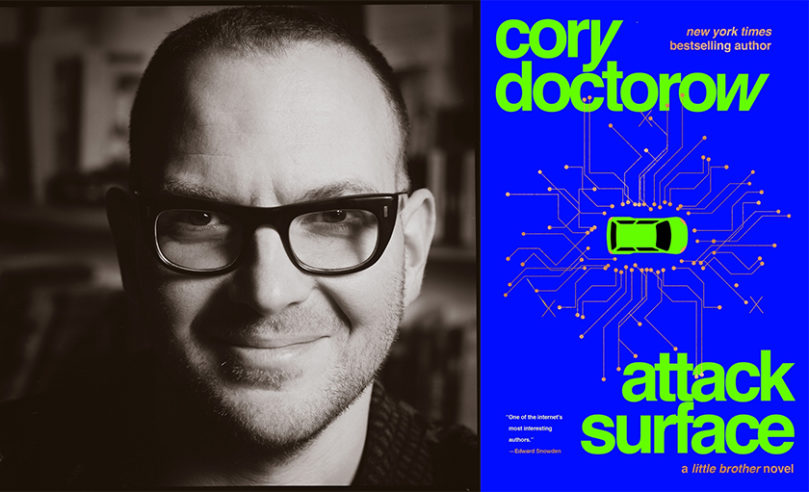We are so excited for all of you to read Attack Surface, so we decided to offer a special treat—an inside look into Cory Doctorow’s writing habits and advice! Check out his video on writing here.
Excited for the book? Pre-order Attack Surface here!
opens in a new window opens in a new window
opens in a new window opens in a new window
opens in a new window opens in a new window
opens in a new window opens in a new window
opens in a new window
Transcript of video:
On Writing with Cory Docotorow
Question: What is your favorite way to procrastinate?
Cory Doctorow: I think my favorite way to procrastinate is to write something else. I have written whole books by procrastinating about books. Little Brother was written while I was procrastinating about Makers.
What is your ideal time and place for writing?
CD: It’s funny, I have a writing space at home. I have an office full of books and tchotkes, that you know–I just had a writing friend over and he was like ‘Oh it’s the opening credit reel from that Ray Bradbury show where he shows you all of his junk.’ And I’m like: ‘Yeah, basically’. And I’ve got a 40 inch monitor and a great chair and a standing desk that comes up and down and all of the things! And yet, I have to say, I do the majority of my writing on the road. I always have.
I sold my first novel while I was doing a startup and then I went to work as the European director of an NGO. I was on the road 27 days a month, and I learned to write with my laptop folded all the way vertical and my fingers like this (gesture: hands bent back fully back palms out, fingers crooked in a typing motion) on the keyboard. And then between flights I would crouch down next to the toilets where the AC outlet was because Always Be Charging is the lesson of any writer.
So as it turns out, I write everywhere. In theory, I write at home, but that’s pretty aspirational.
What’s your advice for writing complicated and occasionally unlikeable characters, like Masha in Attack Surface?
You know they say that no one is the villain of their own story, but anyone who’s ever lain awake at night recriminating with themselves about some thing that they did that day or 10 years before knows, it’s actually pretty easy to be the villain of your own story. That compartmentalization, self doubt, and inability to be perfect is, I think, part of the human condition. And there is something very sympathetic, being in the head of someone who’s wrestling with their better nature and their worse and who’s rationalizing their way in and out of trouble.
Masha was a fun character to write because she knows when she’s rationalizing and she doesn’t kid herself about it. And because of that, she thinks she’s better than people who think they’re doing good–who talk themselves into thinking that they’re doing good even when they’re not. It made for really gnarly writing. It also I think it changed how I think about my own life. I mean, like everyone else, I am a flawed vessel, and being inside the head of someone who was so rigorous with and hard on herself made it a little harder for me to kid myself when I knew I was doing the wrong thing.


